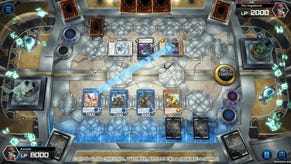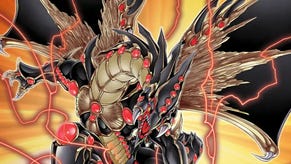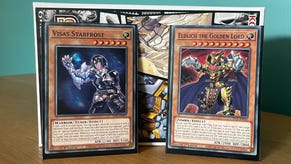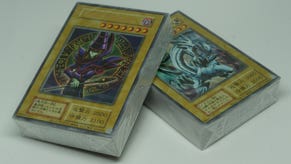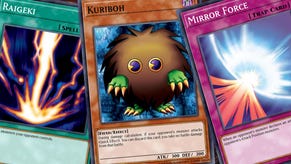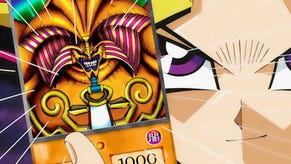Japan’s card game shops have cultivated community and companionship to fill the gap left by vanishing public spaces
Meeting Yu-Gi-Oh! players who have made a local store their second home.
If you ever take a trip to Japan and step off the train into the warm embrace of Akihabara’s Electric Town, one of the first things you’ll likely notice as you step out the station is a large, looming shopping complex with a bright yellow sign. The complex is called Radio Kaikan, a multi-storey collection of stores most likely recognisable to international audiences thanks to its appearance in popular anime like Steins;Gate. Within its 10 floors is just about everything you could want when it comes to anime and manga goods, from elaborate figures to various anime-themed knick-knacks and goodies. Amongst that are no fewer than seven card shops dedicated to Yu-Gi-Oh! and other popular trading card games, including Magic: The Gathering, Pokémon, Weiß Schwarz and Shadowverse.
The building stands as a neon greeting to the so-called otaku capital of Japan, although if you choose to skip this particular excursion you can also find a wide selection of card shops all across Akihabara - or indeed, just about anywhere within the sprawling Tokyo metropolis. The local card shop is a hub of activity, the community built within their walls from like-minded players as you trade, play and make friends with fellow fans: the reason a casual interest in a TCG can become a lifelong obsession, whether you’re in Japan, the UK or South Korea.
Yet the card shops of Japan offer an experience unlike those found anywhere else in the world. These are the hubs that cultivate these card games into national and international phenomenons, each as intimate as they are plentiful nationwide. While it would be near-impossible to put an exact number on the amount of card shops in Tokyo alone, there are currently 61 affiliated with Yu-Gi-Oh! maker Konami for official in-store events, tournaments and products across the 23 wards that make up Japan’s capital. That’s without counting the hundreds of stores spread out across the country, too.
To truly understand what makes Japanese card shops unique, we weren’t going to find the answer by looking at numbers on a page. So we chose to visit these Japanese card shops for ourselves, giving us a chance to meet the players who fell in love with Yu-Gi-Oh! and are proud to call these stores their home away from home.
Stepping into a Japanese card shop can at times feel like stepping into a museum. Of course, you can purchase booster packs from the latest releases and find just about anything you could need - from card storage to protective sleeves and more freely available. Beyond that, however, are rows and rows of display cabinets.
As opposed to a binder of rare cards for patrons to peruse, cards are displayed proudly in the open, publicly visible behind sheets of glass that dominate the floor space of just about any store you walk into. Everything from brand new holographic cards to hard-to-find curios from the earliest sets can be found within these displays, an experience that leaves you feeling immersed on all sides by the past and present of a historic game approaching its 25th anniversary.
It makes even the experience of browsing these stores more enjoyable. Crowding over a small binder can make browsing these collections a solitary experience, a feeling far removed from the groups of friends chatting and laughing as they peer inside these cabinets at the cards they seek - alongside the many others they can only dream of owning. Even if you aren’t after any cards in particular, there’s a rush that comes from spotting a magazine competition prize edition of Dark Magician selling for £750/$950 (138,000 yen to be exact) and pointing it out to your friends.
Stepping into a Japanese card shop can at times feel like stepping into a museum.
The museum comparison doesn’t stop at these for-sale displays either. Sometimes these stores can offer a glimpse into the history of the game through their offerings. In Radio Kaikan shop magi was a complete in-box edition of the Yu-Gi-Oh! Starter Box from 1999, a very early set in the history of the game in Japan that included a 45-card deck and various accessories such as a score sheet for playing. While their copy was strictly not for sale, online auctions for similar items have regularly sold for values into the thousands.
While many of the stores we visited while putting together this piece were based in Akihabara, don’t think you should be restricted to the neighbourhood if you want to find rare cards, buy Japanese booster packs or meet other players. Major retailers will stock at least the most recent booster packs, while other card stores in locations such as Ikebukuro, Shinjuku, Naka-Meguro and Shinjuku - or locations only a short train journey outside the city centre such as Futago-Tamagawa - offer a less frantic experience for those who struggle in the bustling crowds typically occupying the Akihabara locations. Dragon Star is one such chain of stores with other locations both inside and outside Tokyo.
If you’re only after picking up a few rare cards while on a holiday to the city, don’t forget to shop around. Each store has their own pricing and, with the surge in popularity for all TCGs following the COVID-19 pandemic, even outlets like Book-Off, known most notably for their wide array of second-hand books, CDs and video games, have their own collection of rare cards on display.
Whether you’re a dedicated player or a casual observer you can lose hours gawking at the cards in these displays or tracking down the one you need to complete your collection, with a huge array of stores dedicated solely to selling secondhand cards and new products. Others, such as Dragon Star or Card Labo, also provide extensive table setups for players to duel with others, and often host their own tournaments and events to encourage players to meet and play.
Indeed, this is a necessity to be classified as a Yu-Gi-Oh! partner store in Japan. The requirements to receive certification as a Konami Friendly Shop include offering a space for duelists, a rule that all events hosted must be free to enter and creating an environment conducive to teaching new players the rules of the official Trading Card Game and its simplified spin-off Rush Duel. In return, alongside their own events, stores are able to host official Konami events, as well as offering unique sets and prize cards exclusive to partner stores and participating in special promotional campaigns.
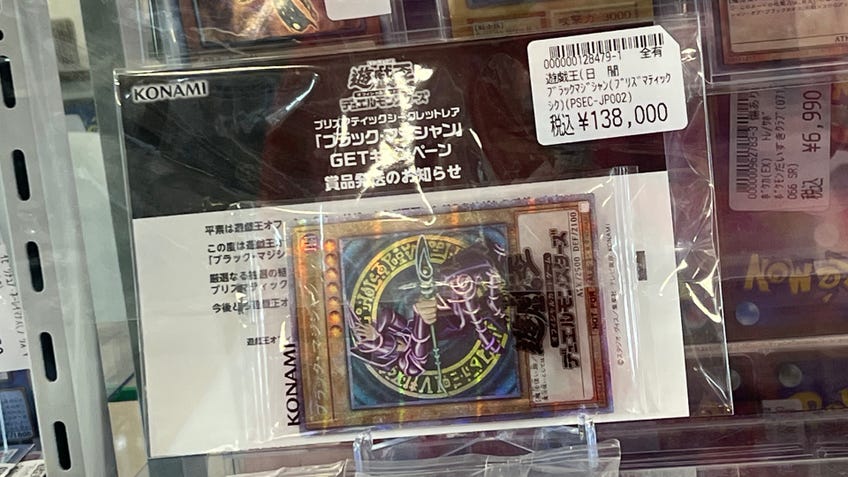
This is evident when looking at the particularly packed event schedule at Card Labo. There are special events and themed duel sessions run on a near-daily basis, including both original and Konami-branded nationwide events occurring simultaneously across all satellite stores. These events are varied and encompass both advanced-rule TCG formats as well as Rush Duel, alongside all-new formats with their own quirks for people seeking out something different, such as two-versus-two duels with their own rulesets.
These organised events bring purpose to attending beyond showing up and hoping to make new friends. It’s this dedicated, almost overbearing schedule of events and organised play that has encouraged many players. During my visits to various card shops I got to meet a number of players who each shared their views that the community support offered by Konami and the sheer scale and frequency of events keeps them engaged in an ever-changing card scene, while also providing space to experiment with their style of play and make new friends along the way.
Beyond a space to meet like-minded players and duel, these are crucial community hubs in areas with a dire need for them.
Haruto Takahashi has been attending card game tournaments for a few years, having played Yu-Gi-Oh! since they were a child. Although they eventually stopped playing as they got older and their school work became more intense, they returned to the TCG during their university days in 2019. What these events offered wasn’t just an opportunity to showcase the skills they refined over many years, but a space to meet other players.
“I started watching old episodes of the anime while I worked at university, and it made me interested in playing the game like I used to with friends in my hometown,” he explains. “I didn’t know anyone else at my university who was also playing Yu-Gi-Oh! at the time, but at one of the first tournaments I went to I bumped into someone from my class and got to know many other players from there. We often share strategies and duel each other even when we should be studying!”
Ishida is another player with over 10 years of experience playing the game. Although their work has prevented them from participating in many tournaments in recent months, the experience of visiting these stores to improve their skills and meet new people is important for them. For him, had it not been for the friends he made playing Yu-Gi-Oh! and the community in these shops that embraced him, he may not have been playing today.
“You can’t exactly play card games alone,” he explains after I asked whether he would still be playing Yu-Gi-Oh! over a decade later had it not been for this community. “With friends you can try out different decks and share advice and ideas, which really encourages you to keep playing. Also, if you get along with your friend’s friends your social circle expands and you can meet and play with them at card stores as well.”
That said, there’s more to the appeal of these stores than just card games. Beyond a space to meet like-minded players and duel, these are crucial community hubs in areas with a dire need for them. Tokyo in particular lacks in non-commercial spaces to meet new people, hang out with friends and enjoy youth. Whereas the streets of Harajuku used to be filled with the music and rebellious punk of youth, seeping out of the nearby park into the streets in a multi-coloured cacophony of fashion, art and friendship, many of these spaces were clamped down on throughout the 1980s and 1990s, opening up car-free streets and reducing loitering.
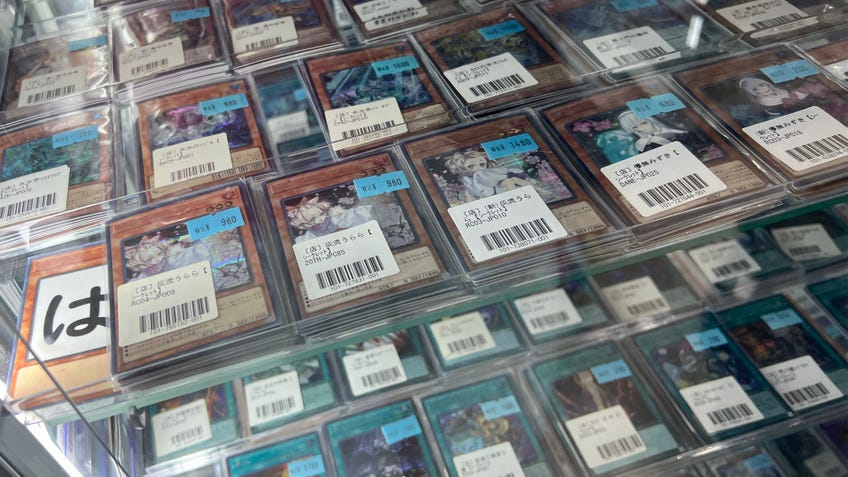
Much of this community retreated underground and still thrives, but it’s less accessible today as a result. Beyond shopping, cinemas, arcades and restaurants, all places that require monetary investment in order to enjoy, the city’s scant public parks remain some of the only open spaces still available for universal free public use.
Even on weekdays these stores are bustling with activity and excitement for the thrill of the duel.
It’s not like the spaces in these stores exist purely for charity. If you’re playing a TCG you’re likely buying cards, and the loyalty of players to their local store means you will likely spend money buying new packs and cards to strengthen your deck at the store in question. To this end, many Japanese TCG champions have been known to sell their prize cards to their local store for display as an almost ‘thank you’ for cultivating their growth as players. Still, stores rarely charge for use of their tables; on quieter days these tables can be bustling just as much with the idle chit-chat of good friends catching up and discussing life as they are with players laying down combos in the heat of a duel.
These stores provide a rare public space for people to whittle away the hours without the incessant pressure of spending money to earn their place. If you enter one of the many free tournaments these stores operate on a more-than-weekly basis, that’s hours that can be spent hanging out and having fun until long after the sun has set. Even on weekdays these stores are bustling with activity and excitement for the thrill of the duel.
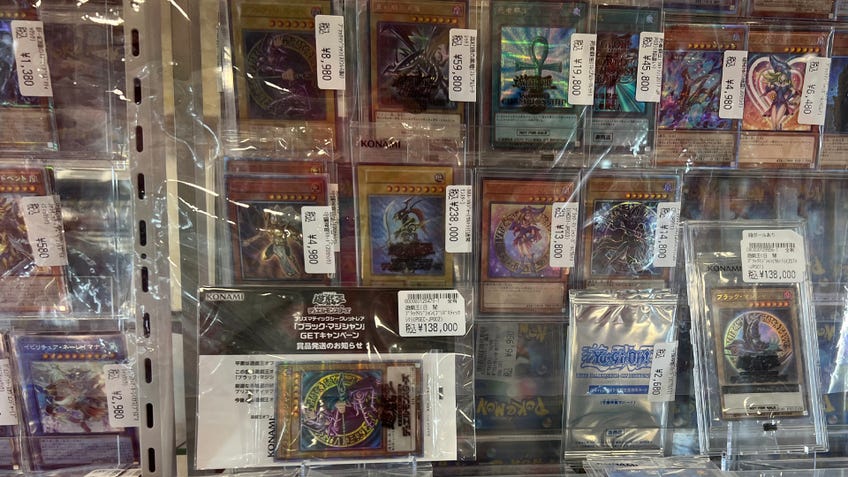
The day we visited C-Labo was the day of the Yu-Gi-Oh! Festival, a nationwide event held at stores across the country. There were players young and old teaching each other strategies and duelling. Yu-Gi-Oh! had become a great social equaliser that brought people from all walks of life together into this one space.
The sheer quantity of these stores which pepper the landscape, the clientele that inhabit them and the nature in which these stores are managed is unique, creating an in-store environment unlike any other. Local card shops offer a space to be together and share a common interest in a place where those spaces have dwindled rapidly.
Yu-Gi-Oh! may have first come to life from the pen of the late Kazuki Takahashi, but the TCG endures thanks to the heart and soul that radiates from the walls of these stores. As we reach 25 years of the card game’s existence and look to the future, if the game is to endure for the next quarter of a century, it will be built on the backs of the fans who make these stores their second home.


